| Srl | Item |
| 1 |
ID:
160467
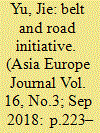

|
|
|
|
|
| Summary/Abstract |
This article explores the linkages between domestic affairs and foreign policies in China in fulfilling its grand ambition of Belt and Road Initiative (BRI). It examines the complexities in decision-making process of “BRI” inside Beijing’s administration. It departs from the most existing literature on BRI in Europe, which focus upon the geo-economic and geo-political impacts of the BRI. Instead, it adopts an “inside-out” approach by examining the actual policy process with a primary focus to individual actors such as the Party, the government department and the state-owned enterprises as well as individual academics. It also disentangles the intricate relations amongst the Party, the key decision-making institutions and the policy execution entities in determining the final outcome of the BRI. It will finally reflect the extent to which Beijing’s bureaucratic complexities have impacted upon the EU and its member states’ willingness in collaborating or in formally endorsing China’s BRI.
|
|
|
|
|
|
|
|
|
|
|
|
|
|
|
|
| 2 |
ID:
129639
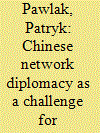

|
|
|
|
|
| Publication |
2014.
|
| Summary/Abstract |
For decades, a prevailing view has been that a very limited number of global issues can be resolved without the USA and European Union acting together. But in recent years, we have seen a growing body of scholarship addressing the question of the 'diffusion of power', 'the rise of the rest' or 'global zero'. With the financial crisis, questionable foreign policy choices and growing global competition from other international actors, both in terms of trade and ideas, the idea of the Western domination is increasingly questioned. At the same time, many international actors, including the European Union, are increasingly shifting-or 'rebalancing'-their attention towards China and other Asian markets introducing new dynamics to old alliances and relationships. Borrowing from the network analysis scholarship, this paper looks at the EU relationship with China through a conceptual lens of 'network power' and 'network diplomacy'. It applies this analytical lens to investigate the implications of EU-China relations for (1) the relations with the USA, (2) the relations with the ASEAN and (3) the effects of the trilateral EU-China-US cooperation on the region.
|
|
|
|
|
|
|
|
|
|
|
|
|
|
|
|
| 3 |
ID:
183715
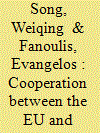

|
|
|
|
|
| Summary/Abstract |
The European Union's partnership with China has received significant academic attention. Experts have focused on both parties’ economic and political objectives and have made efforts to grasp the dynamics of the institutionalisation of EU-China cooperation. However, little has been said about how this collaboration affects the lives of citizens, especially in China. Adopting a Foucauldian epistemology, this article's key contention is that EU-China cooperation imposes a joint form of post-liberal governmental power on the Chinese population, which socially constructs empowered but not liberal political subjectivities for Chinese citizens. The article first reviews Foucault's approach to governmentality. It then explores Sino-EUropean collaboration after 2013, when the two partners established the ‘EU-China 2020 Strategic Agenda for Cooperation’. We illustrate how the institutionalisation of the partnership has been consistent with a governmentalised political rationality, and how policy implementation has allowed a post-liberal form of governmental power to flow from both EU and Chinese policymakers towards the Chinese population, triggering processes of political subjectivisation.
|
|
|
|
|
|
|
|
|
|
|
|
|
|
|
|
| 4 |
ID:
129594
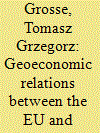

|
|
|
|
|
| Publication |
2014.
|
| Summary/Abstract |
The merging of geopolitical and economic goals, known as geoeconomics, is becoming more and more frequently an important factor of state policies in the age of globalisation and the changing international order. The article offers an analysis of the EU-China relations seen within the increasingly valid geoeconomics perspective. It is focused on two case studies: armament embargo after 1989 Tiananmen Square protests and the Galileo system (a European system of satellite communication). The aforementioned cooperation has laid bare the weakness of European geopolitical thought. It has also demonstrated the supremacy of short-term economic goals of the European actors over strategic goals (both within the economic and the political spheres). In contrast with China, the EU does not possess a coherent geoeconomics strategy.
|
|
|
|
|
|
|
|
|
|
|
|
|
|
|
|
| 5 |
ID:
188169
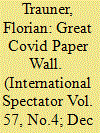

|
|
|
|
|
| Summary/Abstract |
In reaction to the Covid-19 pandemic, the Chinese authorities have installed visa restrictions and strict quarantine rules to prevent foreigners from spreading new infections to the country. This has disrupted a trend of increasing European Union (EU)-China travel and socio-economic exchanges. EU citizens living in or travelling to China have had to deal with the consequences of Beijing’s so-called Zero-Covid strategy. In view of quasi-closed borders, many Europeans have given up on living in or travelling to China. Those who have stayed have come up with strategies of adaptation, while European-owned firms have reacted by adopting initiatives such as doing business online or localising staff. Overall, the Chinese visa restrictions have added a new dimension to the debate on asymmetries in EU-China relations.
|
|
|
|
|
|
|
|
|
|
|
|
|
|
|
|